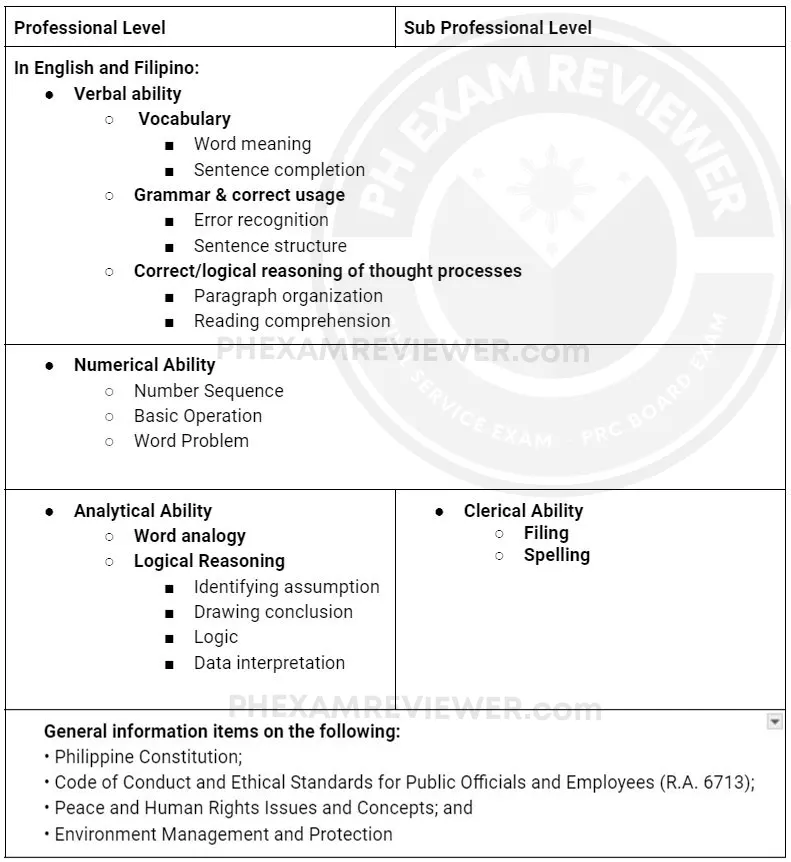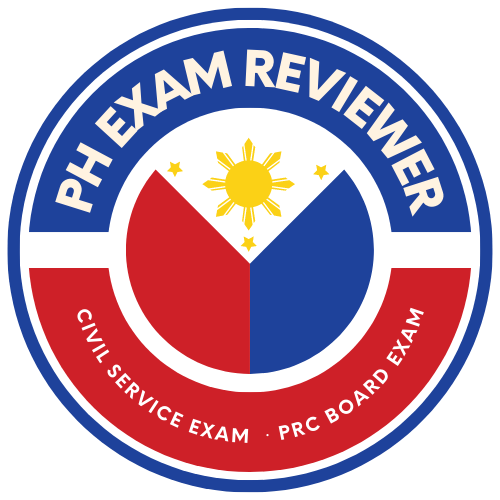Table of Contents
Professional Level & Sub-Professional Level have almost similar scope of exam. This article is updated as of 2024 and will guarantee you the latest civil service exam scope.
- Subprofessional: For positions that require less complex skills.
- Applies to those with a high school diploma or a course shorter than four years.
- Qualifies you for first-level government positions. These typically involve clerical, trades, crafts, and custodial work.
- Professional: For positions that demand higher-level skills.
- Requires a four-year college degree.
- Opens doors to applying for both first-level and second-level government positions. This broader range includes professional, scientific, managerial, and technical roles, along with higher-level clerical jobs.
Professional Level Civil Service Exam Scope:
Verbal Ability:
- Vocabulary: Understand and use a wide range of words.
- Word Meaning: Grasp the meanings of words in context.
- Sentence Completion: Fill in the missing words to complete sentences.
- Grammar & Correct Usage: Apply proper grammar rules.
- Error Recognition: Identify mistakes in sentences.
- Sentence Structure: Understand sentence construction.
- Logical Reasoning of Thought Processes: Analyze and reason logically.
- Paragraph Organization: Arrange ideas coherently.
- Reading Comprehension: Understand passages and answer questions.
Numerical Ability:
- Number Sequence: Identify patterns in numbers.
- Basic Operations: Perform arithmetic calculations.
- Word Problems: Solve real-world math problems.
Analytical Ability:
- Word Analogy: Recognize relationships between words.
- Logical Reasoning: Apply logical thinking.
- Identifying Assumption: Identify underlying assumptions.
- Drawing Conclusion: Make informed conclusions.
- Logic: Understand logical principles.
- Data Interpretation: Analyze data sets.
Sub-Professional Level Civil Service Exam Scope:
Verbal Ability:
- Vocabulary: Understand and use a wide range of words.
- Word Meaning: Grasp the meanings of words in context.
- Sentence Completion: Fill in the missing words to complete sentences.
- Grammar & Correct Usage: Apply proper grammar rules.
- Error Recognition: Identify mistakes in sentences.
- Sentence Structure: Understand sentence construction.
- Logical Reasoning of Thought Processes: Analyze and reason logically.
- Paragraph Organization: Arrange ideas coherently.
- Reading Comprehension: Understand passages and answer questions.
Numerical Ability:
- Number Sequence: Identify patterns in numbers.
- Basic Operations: Perform arithmetic calculations.
- Word Problems: Solve real-world math problems.
Clerical Ability:
- Filing: Understand filing systems.
- Spelling: Spell words correctly.
Both Professional and Sub-Professional Levels:
- General Information Items:
- Philippine Constitution: Understand the country’s 1987 constitution.
- Code of Conduct and Ethical Standards for Public Officials and Employees (R.A. 6713): Know ethical guidelines.
- Peace and Human Rights Issues and Concepts: Be aware of peace and human rights matters.
- Environment Management and Protection: Understand environmental concerns.
Here is the summary of the Civil Service Exam Scope

The only difference between Professional level and Sub Professional Level is that in professional it has analytical ability while in sub professional it has clerical ability. If you want to know how many items and the time limit of the civil service exam then go to this page.
If you are looking for a guide to pass the exam then you can check this FREE course and practice test for you.
This is the official post directly from Civil Service Commission.


